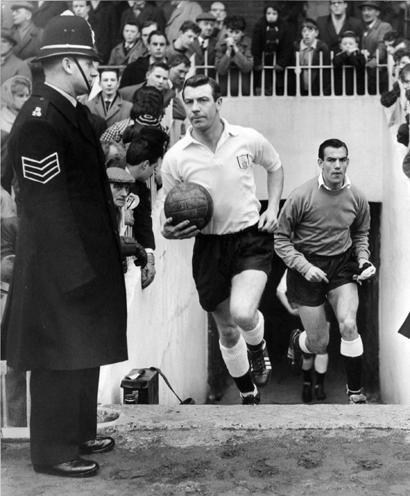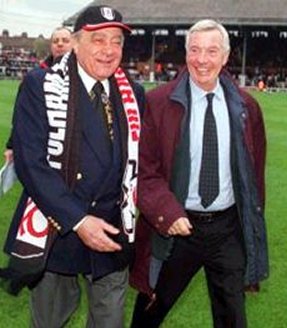 |
| Johnny Haynes leads Fulham out |

Fulham and England midfield legend Johnny Haynes has died at the age of 71, following a car crash in Edinburgh.
He was taken to Edinburgh Royal Infirmary but died of his injuries during the evening.
His passenger, a 65-year-old woman, was treated for chest injuries, and the driver of the other vehicle, a 48-year-old man, escaped uninjured.
A spokesman for the hospital said: “I can confirm Johnny Haynes has passed away tonight. His wife remains in hospital in a stable condition.”
Johnny
Haynes will forever be part of football history as the first
player to earn £100 a week, but there was far more to
him than the money his talents earned. Johnny turned his back
on the fortunes he could have received elsewhere, and remained
loyal to Fulham where he spent his entire 18 year career.
Born in 1934 in Kentish Town North London, Johnny turned professional at the age of 17, in 1952. He played for Feltham in the Middlesex League, Wimbledon in
the Ismian League and Woodford Town, in the Delphian League
because Fulham had no youth team at the time.
Johnny Haynes was the first footballer to appear for England
in every class of football available at the time when he represented
his country at; school, youth, under 23, `B` and full international
level, making his senior England debut, by the time he was 20,
and scoring, in the 2-0 win over Northern Ireland.
Five years
later, in 1960, he was appointed captain of his country, succeeding
Ronnie Clayton but it was events a year later that assured Johnny
his place in football history when, following the abolition
of the maximum wage, he became the first footballer to earn £100 per week.
1961 was also the year that saw Johnny become a key figure in
the England midfield, alongside Bobby Robson, when the two players
were at the heart of a record sequence of international results,
with England winning consecutive matches; 5-2, 9-0, 4-2, 5-1,
9-3 and 8-0. The 9-3 win was over Scotland at Wembley and was
perhaps the match in which Haynes was at his zenith. Johnny
was also captain of the side in that record- breaking run and
while his loyalty to Fulham meant years in the Second Division
it certainly didn`t affect his international career. The last
22 of his 56 England appearances, including the 1962 World Cup,
were as captain.
 |
| Johnny Haynes in happier days with Chairman Mo |

It`s most likely that Haynes would have won a greater number
of caps but for a serious car accident in August 1962 which
kept him out of football for a year. But it didn`t deter clubs
trying to sign him and a year later Tottenham Hotspur, the best
team in the land, tried to sign Johnny with an offer that would
have broken the transfer record but he decided to remain loyal
to Fulham.
Haynes was a master of the long pass and he could also hit the
net as well. In an 18 year league career Johnny scored 159 goals
in 594 games and he also hit 18 for England.
After recovering from the accident Johnny Haynes resumed his
career with Fulham including a spell as player-manager after Bobby Robson was sacked in 1968. A free-transfer enabled him to move
to South Africa in 1970, where he ended his playing career with
a championship medal with Durban City.
Not only did Johnny Haynes pave the way for the vast wages available
to modern footballers in this country he also set high profile
players on the road to the riches available through sponsorship
as he was an early icon for Brylcreem haircream, a necessity
for the young man of the 1950s and 60s.
|